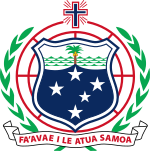Fono of Samoa
|
Legislative Assembly of Samoa Fono Aoao Faitulafono o Samoa |
|
|---|---|
 |
|
| Type | |
| Type | |
| Structure | |
| Seats | 50 |
 |
|
|
Political groups
|
HRPP: 47 seats
Tautua Samoa: 3 seats
|
| Elections | |
| First-past-the-post | |
| Meeting place | |
| Apia | |
| Website | |
| www |
|
The Legislative Assembly is the Parliament of Samoa based in the capital, Apia, where the country's central administration is situated.
In the Samoan language, the Legislative Assembly of Samoa is sometimes referred to as the Samoan Fono while the government of the country is referred to as the Malo.
The word fono is a Samoan and Polynesian term for councils or meetings great and small and applies to national assemblies and legislatures, as well as local village councils.
The modern government of Samoa exists on a national level alongside the country's fa'amatai indigenous chiefly system of governance and social organisation.
The Samoan Fono is descended from the Western Samoa Legislative Assembly established under New Zealand rule in the early 1900s. On the country's political independence in 1962, the 5th Legislative Assembly became the 1st Samoan Parliament.
The Samoan Fono has 50 Members of Parliament. 47 members are matai (traditional heads of families), elected in six two-seat and 35 single-seat constituencies. The other 2 Members are elected by, and represent, individual voters, i.e. "Samoan citizens descended from non-Samoans". An extra Member of Parliament was added after the 2016 election in order to meet the quota of 10% female MPs.
Members of Parliament in Samoa are directly elected by universal suffrage, and serve a five-year term.
The Head of State or O le Ao o le Malo is elected for a five-year term by the Fono.
Elections are held under a simple plurality system. Samoan electors are divided into six two-seat and 35 single-seat constituencies. In addition, two seats are reserved for "individual voters", non-indigenous citizens who may not hold a chiefly title or any customary interest in Samoan land.
Electors must be Samoan citizens and aged over 21. Candidates must be qualified as electors, and in addition those for territorial seats must hold a matai title.
The Fono is responsible for electing the O le Ao o le Malo, the Samoan head of state.
...
Wikipedia
